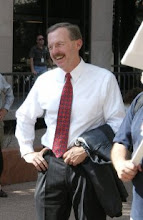
I knew Eugenio de Sosa Chabau. De Sosa Chabau was publisher of the oldest Spanish language newspaper in the Western Hemisphere,
Diario de la Marina, in his native Cuba, when he was imprisoned and tortured for two decades simply for opposing Castro’s communist regime. In Castro’s Cuba editorial criticism brings prison and torture.
Somehow,
America’s Left is not disturbed by Castro’s brand of torture or grounds for imprisonment. This past Friday, Walter Kendall Myers 72, and his wife, Gwendolyn, 71, pleaded not guilty to charges of conspiracy, being agents of a foreign government and wire fraud – all based on long-standing anger about U.S. policies that inspired these aging hippies – the dregs of the ‘60s – to spy for Cuba for three decades. Sadly, they are not alone. A professor in South Florida and even a senior Defense Intelligence Agency analyst have also been convicted of espionage on behalf of Cuba in the past few years. The
Washington Post and other media outlets write sympathetic “news” reports and the notion of Castro’s Cuba as an anachronistically quaint remnant of communism in a tropical paradise persists.
Allow me to strip away the mythology of Castro’s Cuba and lay bare the brutality of his (and his brother, Raul’s) stranglehold on the people living 90 miles from Miami. The spies who betray our country and bolster the Castro regime never met my friend, Eugenio de Sosa Chabau.
De Sosa Chabau and I first met in Miami, FL, during the summer of 2001, thanks to Jose Basulto, the founder of
Brothers to the Rescue, a pro-democracy, humanitarian group of pilots that conducted search and rescue missions for rafters in the Florida Straits. I learned of de Sosa Chabau’s wealthy, prominent family and his upbringing that included his friendship with all-boys prep-school classmate John FitzGerald Kennedy, another member of the Class of 1935 at the exclusive
Choate School in Connecticut.
De Sosa Chabau’s friendship with Kennedy and his success at smuggling an early warning out of prison to the U.S. Government concerning the stationing of Russian missiles on the island nation would earn him prolonged physical and psychological torture.
In October 2001, de Sosa Chabau and I traveled together to Brussels, Belgium, where he filed a complaint in the
Belgian Royal Courts against Castro for committing crimes against humanity. I am honored to have prepared de Sosa Chabau’s sworn declaration that served as the primary exhibit in the Court complaint.
Three months later de Sosa Chabau died of cancer during a visit to his family in Dallas over the Christmas holiday.
Throughout his 20-year sentence, de Sosa Chabau was tortured in various prisons throughout the island, including the notorious Isle of Pines and later at the
Mazorra Psychiatric Hospital outside of Havana
His punishment included frequent beatings by prison guards, electric shocks to his head and genitals, as well as being force-fed and injected with hallucinogenic drugs. He often went days without food or water and was kept in a tiny, dark dirt cell during periods of solitary confinement. On one occasion the prison administrators orchestrated an elaborate ruse trying to convince him that his daughter and grandchildren had been killed in a plane crash – all in an effort to break de Sosa Chabau psychologically.
De Sosa Chabau was released from prison in 1980. Years later he relived some of his nightmarish experiences in prison when he recognized a man in South Florida who had tortured him with electric shock. That man, Eriberto Mederos, a head nurse at Mazorra Psychiatric Hospital, was convicted on August 1, 2002, of obtaining American citizenship fraudulently. Mederos specifically told de Sosa Chabau that the purpose of his punishment in the hospital was because of his “counter-revolutionary” opposition to the Communist dictatorship in Cuba. On August 23, 2002, Eriberto Mederos died before a sentence was imposed.
Those committing espionage against the United States betray our country and condemn those Cubans seeking a the slightest glimmer of individual liberty to electric shock, hallucinogens, filthy cells, poor food, and forced labor, among other indignities, for their “counter-revolutionary” thoughts or deeds.
Where is the week-long profile of Castro's torture and imprisonment on the front pages of the
New York Times, Washington Post or
Los Angeles Times? How about the CNN special? Where is the media's interest or respect for a newspaper publisher of the integrity, bravery and caliber of my friend, Eugenio de Sosa Chabau?
Sphere: Related Content











